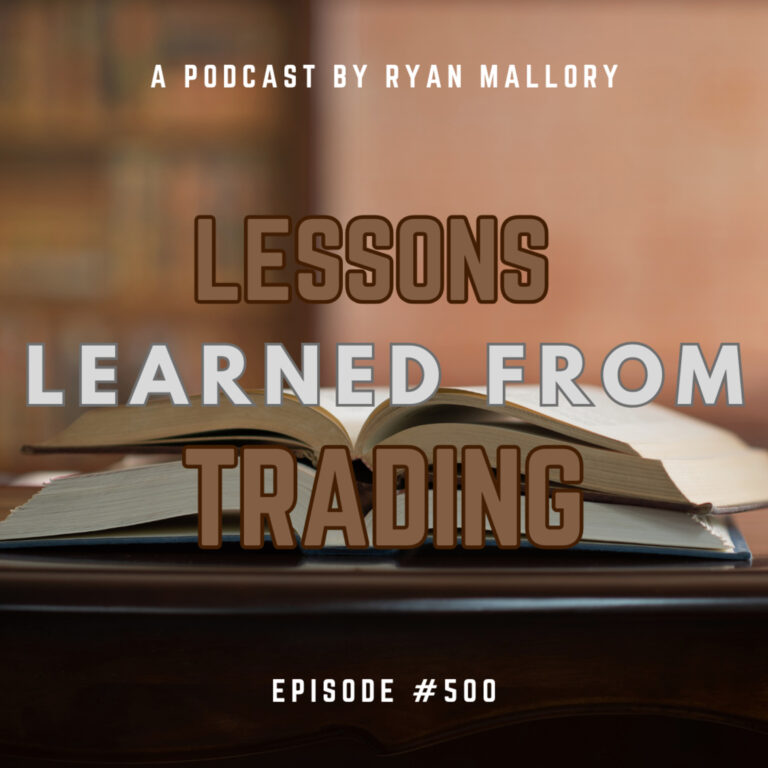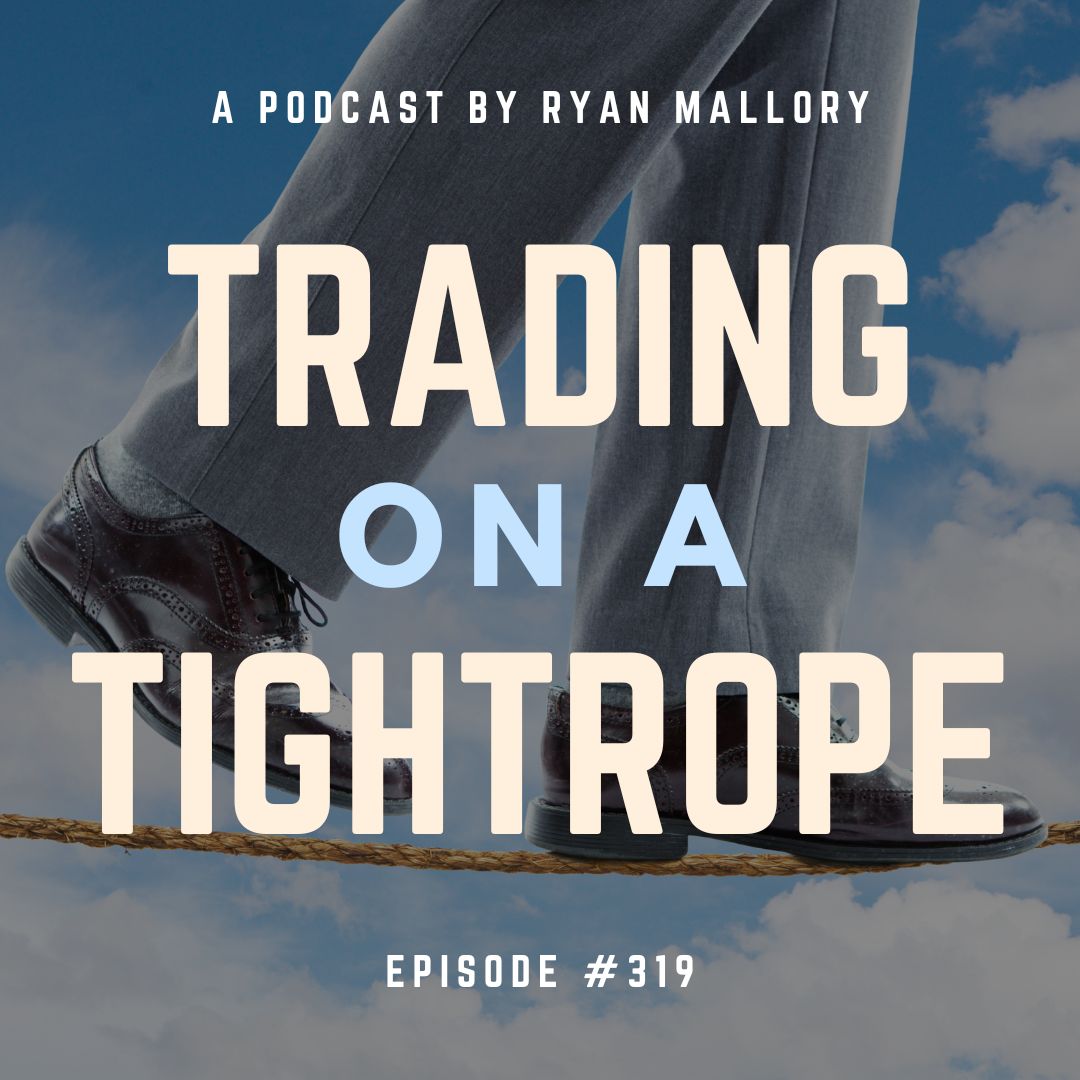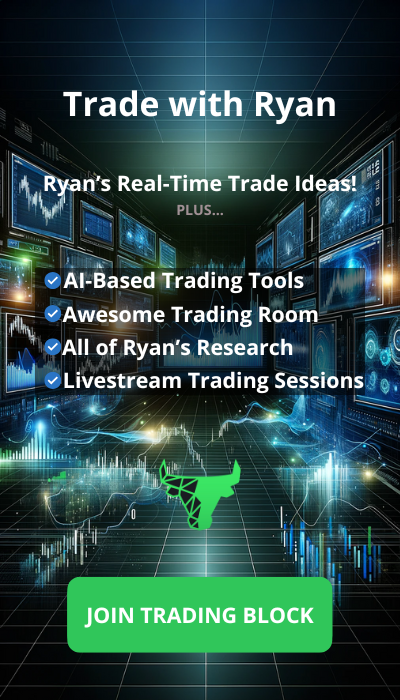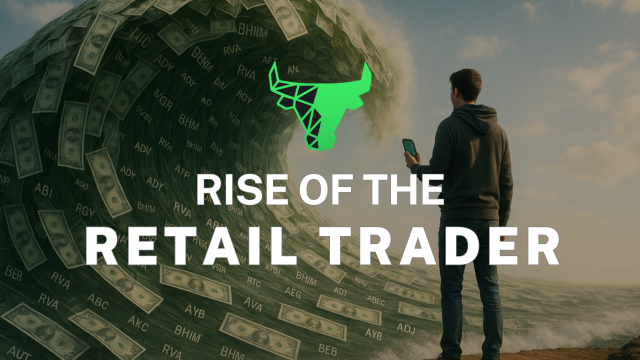Episode Overview
Should you take bigger risks when you have a backstop of income? Perhaps it is your fulltime job, or perhaps you are a trust fund baby that can just keep pulling from an account to mask the lack of quality swing trading outcomes. In this episode, Ryan talks about how you have to be willing to walk the tightrope and not just skip down the Yellow Brick Road, unafraid of the outcome of your trade or the risk associated with it.
Available on: Apple Podcasts | Spotify | Amazon | YouTube
Episode Highlights & Timestamps
- [0:07] Introduction
Ryan introduces the theme of trading with a trust fund and the dangers of dismissing risk. - [1:28] Lessons for Everyone
Why even those without a trust fund can learn from this trader’s story. - [3:26] Walking the Tightrope
Ryan explains the metaphor of treating every trade like a tightrope walk to highlight the need for risk awareness. - [6:55] How You View $100
Why your attitude toward small amounts of money can reflect your respect for all capital. - [10:35] The Ripple Effect of Bad Decisions
Ryan explains how one poor decision can snowball into financial disaster.
Key Takeaways from This Episode:
- Respect Your Capital: Your mindset toward money should not change just because you have a financial cushion or backup.
- Trade Like Every Trade Matters: Act like you’re walking a tightrope by being precise, cautious, and balanced.
- Avoid Leveraged Recklessness: Leveraging beyond your means, even outside of trading, can destroy financial futures.
- Don’t Mask Mistakes With Paychecks: Having a regular income is not a license to continue bad trading behavior.
- Generational Wealth is Fragile: Most inherited wealth doesn’t make it beyond the third generation due to lack of discipline and appreciation.
Resources & Links Mentioned:
- Swing Trading the Stock Market – Daily market analysis, trade setups, and insights by Ryan Mallory.
- Join the SharePlanner Trading Block – Get real-time trade alerts and community support.

Take the Next Step:
✅ Stay Connected: Subscribe to Ryan’s newsletter to get free access to Ryan’s Swing Trading Resource Library, along with receiving actionable swing trading strategies and risk management tips delivered straight to your inbox.
📈 Level Up Your Trading: Ready for structured training? Enroll in Ryan’s Swing Trading Mastery Course, The Self-Made Trader, and get the complete trading course, from the foundational elements of trading to advanced setups and profitable strategies.
📲 Join the Trading Community: Sign up for SharePlanner’s Trading Block to become part of Ryan’s swing-trading community, which includes all of Ryan’s real-time swing trades and live market analysis.
Full Episode Transcript
Click here to read the full transcript
0:07
Hey, I’m Ryan Mallory and this is my swing trading the stock market podcast. I’m here to teach you how to trade in a complex ever-changing, world of Finance, learn what it means to trade, profitably and consistently managing risk, avoiding the pitfalls of trading. And most importantly, to let those winners run wild, you can succeed at the stock market and I’m ready to show you how, hey, everybody, this is Ryan Mallory with swing trading the stock market in today’s.
0:35
Episode. We’re gonna title it trading on a tightrope. This is episode 3, 19. And in today’s email, we are going to do more of a storytelling time here instead of actually reading the actual email, just because it’s kind of difficult to read the email without giving away too much of this guy’s personal information.
0:52
So, long story short, this is a person he’s trading with some big money, right. Doesn’t have a lot of experience in the stock market fairly young early 20s. But he’s a trust-fund baby, and anybody knows what trust fund, baby? Is it basically a Essentially a somebody that has a lot of money to their name, locked up in a trust fund.
1:09
May or may not have access to it, depending on how old they are. But this person has access to the trust fund and is trading stocks out of it. So how does a person really contemplate risk? How does a person really take treating serious in the risks associated with it when he has a huge trust fund the back them up?
1:28
Now, I know what a lot of you people are thinking, right here, like Ryan. This has nothing to do with me. I’m going to go ahead and listen to the next Episode or a previous episode that I like, don’t do that because they’re still lessons for you to learn here. And there’s a reason why I called it trading on a tightrope because I gave a lot of thought to this story and this particular traitor, he’s telling me that, hey, I buy these stocks, I end up taking some big losses, but it’s okay because I’ll just take the money out of my trust fund and refund it, you know, it’s like, I never even took a loss, you know.
1:56
So, he’s taking some big swings at the fence here, taking some very volatile trades trading, some very big positions, and taking some heavy losses, but it doesn’t bother him now for a lot of That would bother us because we just don’t have the luxury of just being able to throw away money. But this particular person does, he has the luxury of being able to do.
2:12
It doesn’t worry about it. Hey, if you lose this, he will just replenish the account. Now, it doesn’t matter how rich you are. There is an extent of how much money you can afford to lose, but some people can afford to lose a lot more than you. And I, and we saw in the past year alone, just how volatile it can get even for somebody who’s worth billions of dollars.
2:34
Elon Musk, as He put in a 45 billion dollar bid, I think it was for Twitter. He also saw the market pullback substantially taken a significant hit to Tesla. I mean Tesla was worth at one point over four hundred dollars a share dropped all the way down to 100. It’s a 75 percent. Drop significantly hitting Elon musk’s net worth.
2:51
He fell from being the richest person in the world is being one of the richest people in the world. But nonetheless, a significant hit that almost put the Twitter deal in Jeopardy or so a lot of us thought. So there’s an extent to how careless you can be with your money even you. Bus proof that one last year.
3:07
And so if you have a trust fund, or if you have a backlog of money that you can always just keep pulling from to cover up your mistakes, while you can just keep swinging a big hoping that one of them will stick and you can make just a ton of money. Yeah, that’s a different perspective that a lot of us aren’t afforded, but my thought is this, I would rather put my faith in a person who’s walking, a tightrope.
3:26
If you’re walking a tightrope, what are you doing? First of all, you are walking a very straight line or trying to do the best that you can. You’re following this rope, you’re making sure that each foot is going in front of The other very, very carefully. You’re walking as straight of a line as you can, you’re keeping your balance. And so, I’d rather put my faith in a person who’s Walking the Tightrope and somebody who’s, you know, skipping down the yellow brick road, laughing and giggling, and not worried about the possible losses.
3:49
He might take because that person has a trust fund, the back a month. Now, trust funds are nice. I wish I had to trust fund. Absolutely, that’d be pretty nice. I don’t have one, but if I did, yeah, I’d probably have a little bit different of a view about risk, but look at some of the people who have blown their money.
4:05
I mean, Mike Tyson, for instance, I believe it was rumored that he had made over a billion dollars in his lifetime and yet he doesn’t really have that much to show for it and I if I remember correctly I remember him sitting down. Somebody asked him like where did all that money go and he’s like, I don’t know. So just because you have it doesn’t mean that you can’t lose it because you have a buffer in Life or a cushion, when it comes to your finances, doesn’t mean that you should use it for making high-risk trades and bad decisions.
4:32
You can make the same in, this is how we can apply to us for. Art time Traders. We can apply it to part-time Traders as well, because one of the things that part-time Traders have that full-time Traders don’t, is they have another check coming in. So you can say, alright, I made a couple bad trades here, but I’m getting paid next week. So I’ll just take that money and put it back in there.
4:48
That’s what the Wall Street bets crowd was doing. They would lose big on GameStop and then they double down with their next paycheck while they were living a mama’s basement. So I’ll say this again, I’d rather put my faith in a person who’s walking, a tightrope in their trading, rather than someone who’s just skipping down the yellow brick, road, not Worried about the risk.
5:06
A lot of times people treating other people’s money will do this to. You see what hedge funds, that oftentimes will blow up. What are they doing? They’re trading other people’s money so that money doesn’t mean as much to them. It’s kind of like, it’s paper money to some people say. Well, it’s not my money that I’m losing and so, they’ll take bigger risks with it. Sometimes, it’ll pay off but oftentimes it doesn’t and sometimes it does pay off simply because of the actual environment that they’re trading in is very conducive to taking some high risks or very forgivable when taking high risks and they get away with it.
5:35
But eventually that story turns the page to an ugly chapter where the continued application of bad decisions and bad risk management leads to an awful awful trade that you can’t get out of. So my question to, you guys would be this, how would you trade? If you knew that every trade had a significant impact to your financial future, and that’s the mindset that we have to have every trade that I make.
5:57
Yes. If I take a losing trade, is it going to destroy me? No, but I’m not going to take it just because it won’t destroy me. I’m going to make a trade as if every trade. Good result, me falling off of that tightrope. I want to manage the risk in a way that says this trade is important. This trade is one that I need to manage the risk, right?
6:14
If I lose fine but I cannot take unnecessary trays. I cannot take unnecessary loss and that’s the mindset that we have to have as Traders. We have to care about risk, no matter what the backstop is, no matter, what kind of trust fund that we have in our name. And again, if you have a trust fund, not knocking. But there are certain things that come with trust funds because we’re dealing with money that we didn’t.
6:32
And I’m talking about not people who set up trust funds for themselves, but people are like, trust fund babies. There’s a certain mindset there that you’re just basically inherited with. And since that you don’t respect the dollar as much as the person who actually earned it. I think one of the best gauges of how a person views money is how they treat $100, no matter how rich or how poor they are, if they’re extremely rich and they treat $100.
6:55
Like it’s nothing. Yeah, I get that if you’re worth 10 million dollars, it may not be worth much but the people who earn that ten million dollars, they treat a hundred dollars. Like it means something I seen some of the most wealthy people that I’ve ever come Come across still clipped coupons when they go to the grocery store, it’s actually inspiring because it tells you, you got to take that money serious.
7:12
You got to take your capital and trading, extremely extremely serious treat it your money like you’re walking on a tightrope not saying, hey, I have a hundred thousand dollars in my account. I can afford to take some losses because if I take a ten thousand dollar loss I still have 90 thousand dollars left. No, don’t do that. That’s significantly.
7:28
That’s a 10% loss and if you have that mindset eventually that ninety thousand dollars will be worth nothing. Remember growing up there was always some of those rich kids in class and everything and they came from some very, like wealthy backgrounds. I mean, some people who are just filthy rich and, you know, it’s been about 20 plus years since I’ve been out of high school and 42 years old.
7:48
And one of the things that’s interesting is just seemed worth some of those. People are at some of them, came from second and third-generation wealth. And one of the things I’ve noticed is the further you get away from the main source of that wealth. The less appreciative they are of the money, the more Reckless they are with that money the more willing to spend it on On foolish things.
8:05
And rarely in my opinion, does wealth, make it past the third generation. Yes, some wealth does, for instance, Elon Musk or Bill Gates or some of those people. There’s a good chance that, you know, Generations, maybe 100 or 200 years down the road, kind of like the Vanderbilt or something.
8:22
We’ll still have some of that wealth but it shouldn’t be surprising to see that wealth dwindle as future Generations. Get their hands on it because they’ve never known what it means to do. Without one of the things that Me trading with such a strong mindset on risk, is the fact that I’ve experienced what it means to do.
8:40
Without I know what it feels like to lose. A lot of money and to wonder, am I going to be able to keep trading? I’ve experienced that? And so I think it’s really important that if you’re trading and you have some money that you inherited or some money that you have in a trust fund, that was put aside for you to not treat that as a buffer as a reason to make foolish decisions, even if it’s not even in the stock market, if it goes beyond the stock, Market.
9:04
There was a guy that I worked with back in the day when I was in Corporate America. And I remember he went out, this was when the housing crisis was just starting to blow up and he went out and bought like five houses. And I remember sitting in that office with him because we shared an office and he was like, man, Ryan.
9:21
I’m going to make some big money off of this stuff and I’m like, what are you talking about? I think, man, I’m just going to flip these houses. That’s what you gotta do. You gotta flip, and he would quote, Robert Kiyosaki. You got to use other people’s money and then he did that he bought these houses and he He did some Renovations on it, he borrowed some money from the bank, highly highly leveraged and guess what happened?
9:40
He couldn’t sell the houses, couldn’t sell him. He couldn’t rent them and he blew up his whole financial future over those five houses because he couldn’t make mortgage payments. And that guy, he was just a normal guy. He wasn’t even a trust fund baby or anything like that. He just leveraged himself to no end and I know people who continue to leverage themselves in the real estate market to the state.
9:59
They’re still buying real estate properties when you have that price of homes to income. Ratios being like nine and ten to one. You can’t expect that housing market to keep going up like that. But there’s a lot of people out there that are still buying real estate at the peak of a market when they shouldn’t be.
10:18
Let that thing come down. Not every moment is a good moment to buy real estate. And so like the one guy who told you that I worked with he learned that the hard way because he was buying it right at the tip of the market and they’re still people who have not learned that lesson from the Great Recession, doing that still today. But I know I’ve been kind of like all over the With this podcast episode.
10:35
But really what? I would try to tell you guys to take away from it is to whether you’re a part-time Trader, whether you have a trust fund in your name, don’t treat those funds, don’t treat that money. Don’t treat that paycheck, as a way to mask, bad decisions, because bad decisions begat, bad decisions.
10:52
If you make one bad decision, it’s going to likely require you or force you to make another bad decision. If you leverage yourself in the stock market and the market crashes, it’s going to make you and force you to Have to get out of those stock, probably at the worst possible time when you get that Margin Call.
11:08
So like I said, bad decisions lead to more bad decisions. It’s like a lie. You have to tell a lie to keep covering up for that lie, just like that with a bad decision, you have to keep making bad decisions in order to keep that original bad decision from ruining you and eventually you do ruin yourself because too many bad decisions in a row, will be your undoing.
11:27
Now, you know, it’s not a bad decision. Swing trade in the stock market, guys. This is all of my stock market research that I provide My listeners with each and every day you can go to swing trading the stock market.com, you can sign up for it and you’ll get all of my stock market research each and every day that’s going to include my daily.
11:43
Watchlist, my weekly Master bullish, bearish. Watch list updates. Also, you’re going to get big Tech updates and Market updates throughout the week. Really, really good. These are videos that I’m sending your way awesome stuff. I’d highly encourage you to check it out, but don’t do it with your trust fund money.
11:58
And don’t do it with money that you can’t afford to lose, do it because you’re in a good position. Position to be able to trade for yourself. And you’re wanting my research to be able to learn from, and to use for your benefit. If you enjoyed this podcast episode, I would encourage you to leave me a five star review.
12:16
I read them. I appreciate them, and make sure to keep sending your emails. ryan@shareplanner.com, I do read them. I do value them. And I want to make a podcast episode out of every one of them. So, keep doing that. Thank you guys. God bless. Thanks for listening to my podcast.
12:31
Swing trading the stock market. I like to encourage you Join me in the ship under trading block, where I navigate the stock market, each day with Traders from around the world with your membership, you will get a 7-Day trial and access to my trading room including alerts via text email and WhatsApp.
12:47
So go ahead sign up by going to shareplanner.com trading block, that’s www.shareplanner.com/trading-block. And follow me on SharePlanner’s, Twitter and Instagram and Facebook, where I provide unique market and trading information. Every day. You have any questions Please feel free to email me at ryan@shareplanner.com all the best to you and I look forward to trading with you soon.
Enjoy this episode? Please leave a 5-star review and share your feedback! It helps others find the podcast and enables Ryan to produce more content that benefits the trading community.
Have a question or story to share? Email Ryan and your experience could be featured in an upcoming episode!
Become part of the Trading Block and get my trades, and learn how I manage them for consistent profits. With your subscription you will get my real-time trade setups via Discord and email, as well as become part of an incredibly helpful and knowledgeable community of traders to grow and learn with. If you’re not sure it is for you, don’t worry, because you get a Free 7-Day Trial. So Sign Up Today!

Welcome to Swing Trading the Stock Market Podcast!
I want you to become a better trader, and you know what? You absolutely can!
Commit these three rules to memory and to your trading:
#1: Manage the RISK ALWAYS!
#2: Keep the Losses Small
#3: Do #1 & #2 and the profits will take care of themselves.
That’s right, successful swing-trading is about managing the risk, and with Swing Trading the Stock Market podcast, I encourage you to email me (ryan@shareplanner.com) your questions, and there’s a good chance I’ll make a future podcast out of your stock market related question.
In today's episode, at episode 500, I am diving into the lessons learned from trading over the last 100 episodes, because as traders we are evolving and always attempting to improve our skillset. So here is to episode 500, and to another 500 episodes of learning and developing as swing traders in the stock market!
Be sure to check out my Swing-Trading offering through SharePlanner that goes hand-in-hand with my podcast, offering all of the research, charts and technical analysis on the stock market and individual stocks, not to mention my personal watch-lists, reviews and regular updates on the most popular stocks, including the all-important big tech stocks. Check it out now at: https://www.shareplanner.com/premium-plans
📈 START SWING-TRADING WITH ME! 📈
Click here to subscribe: https://shareplanner.com/tradingblock
— — — — — — — — —
💻 STOCK MARKET TRAINING COURSES 💻
Click here for all of my training courses: https://www.shareplanner.com/trading-academy
– The A-Z of the Self-Made Trader –https://www.shareplanner.com/the-a-z-of-the-self-made-trader
– The Winning Watch-List — https://www.shareplanner.com/winning-watchlist
– Patterns to Profits — https://www.shareplanner.com/patterns-to-profits
– Get 1-on-1 Coaching — https://www.shareplanner.com/coaching
— — — — — — — — —
❤️ SUBSCRIBE TO MY YOUTUBE CHANNEL 📺
Click here to subscribe: https://www.youtube.com/shareplanner?sub_confirmation=1
🎧 LISTEN TO MY PODCAST 🎵
Click here to listen to my podcast: https://open.spotify.com/show/5Nn7MhTB9HJSyQ0C6bMKXI
— — — — — — — — —
💰 FREE RESOURCES 💰
— — — — — — — — —
🛠 TOOLS OF THE TRADE 🛠
Software I use (TC2000): https://bit.ly/2HBdnBm
— — — — — — — — —
📱 FOLLOW SHAREPLANNER ON SOCIAL MEDIA 📱
*Disclaimer: Ryan Mallory is not a financial adviser and this podcast is for entertainment purposes only. Consult your financial adviser before making any decisions.





